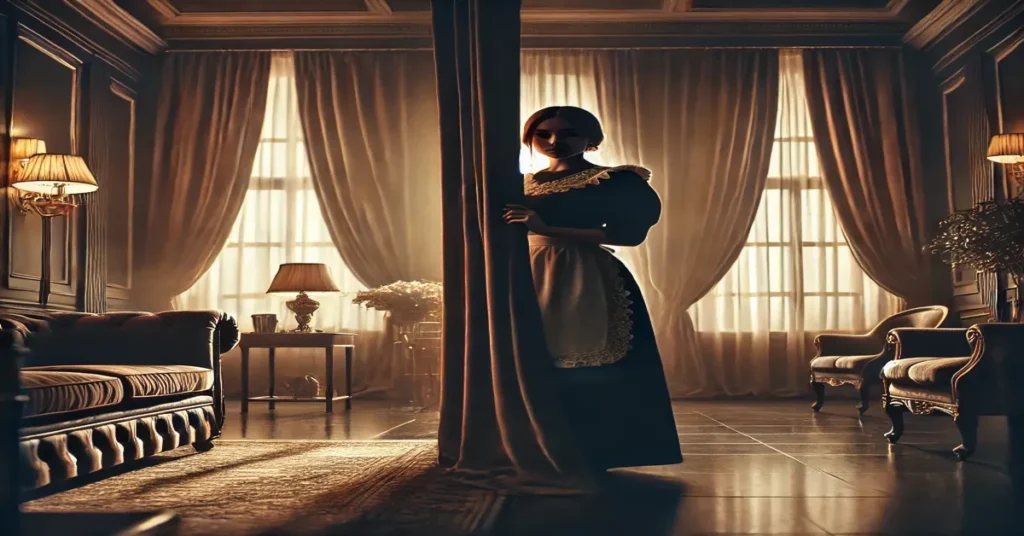The phrase “The Housemaid Is Watching” evokes a sense of intrigue, suspense, and curiosity. Whether interpreted as a literal scenario of surveillance or as a symbolic expression of power dynamics within domestic spaces, the phrase resonates across multiple themes like trust, secrecy, and hidden relationships. It has been used in books, films, and even real-life situations to explore nuanced interactions and the psychological undercurrents of domestic environments.
In this comprehensive guide, we will explore the cultural significance, possible interpretations, and psychological depth of “The Housemaid Is Watching.” We’ll discuss its presence in popular culture, its impact on storytelling, and its reflection of societal concerns. Additionally, this article will delve into how such narratives shape perceptions of domestic roles and relationships.
The Housemaid as a Symbolic Figure
Throughout history, housemaids have held a multifaceted position in both literature and real life. They are often portrayed as diligent caretakers, confidantes, or silent observers of the lives they serve. The idea of a housemaid “watching” creates a dual meaning:
- Literal Surveillance
In some narratives, the housemaid is portrayed as an active observer, witnessing secrets and dramas within a household. This role often leads to the maid becoming a pivotal character in unraveling mysteries or uncovering hidden truths. - Symbolic Representation
The housemaid watching can also be symbolic, representing societal expectations, class divides, or the omnipresent judgment that one may feel in their private space.
“The Housemaid Is Watching” in Popular Culture
The concept of a housemaid watching has been a central theme in various forms of storytelling. Here are some notable examples:
1. Literature
Books like The Housemaid by Freida McFadden delve into the suspenseful relationship between a housemaid and her employers. Such narratives often blend psychological thrillers with domestic dramas, making the housemaid’s perspective crucial to the plot.
2. Films and TV Shows
Films like The Handmaiden (2016) and shows such as Downton Abbey showcase the complex dynamics between housemaids and their employers. In many cases, the housemaid is privy to secrets that alter the course of the narrative.
3. Mystery and Thriller Genres
Thrillers often use the “watching housemaid” trope to create suspense. The idea of a silent observer, potentially holding key information, adds tension and intrigue to the story.
4. Real-Life Stories
Real-world accounts of housemaids uncovering or being implicated in household secrets are not uncommon. Such stories often highlight ethical dilemmas and the blurred lines of loyalty and morality.
Psychological Aspects of “The Housemaid Is Watching”
The phrase touches upon various psychological themes:
1. Power Dynamics
The employer-housemaid relationship inherently involves power dynamics. A watching housemaid can symbolize the subversion of power, where the observer wields influence through knowledge.
2. Surveillance Culture
In today’s age of cameras and constant monitoring, the phrase resonates with the broader theme of living under watchful eyes. It highlights how privacy is often compromised, even within one’s home.
3. Trust and Betrayal
Trust is a cornerstone of the employer-housemaid relationship. The idea of being watched can either reinforce this trust or lead to paranoia and fear of betrayal.
4. Voyeurism and Secrecy
The act of watching, whether intentional or accidental, brings up questions about boundaries and privacy. This theme is frequently explored in psychological thrillers.
The Housemaid’s Role: Real vs. Fiction
The portrayal of housemaids in fiction often differs significantly from their real-world roles.
In Fiction
- Housemaids are often depicted as pivotal characters with hidden motives or insights.
- They may act as catalysts for the plot, uncovering secrets or altering the dynamics of the household.
- Fictional housemaids often have more agency and dramatic roles compared to their real-world counterparts.
In Reality
- Real-life housemaids are often hardworking individuals focused on providing for their families.
- The narratives of drama and secrecy are less common in their day-to-day lives.
- However, the trust placed in them to manage personal spaces highlights their crucial role in households.
Exploring Cultural Variations
The perception of housemaids and their roles differs across cultures:
1. Western Cultures
In Western societies, housemaids are often portrayed as part of the service class, with their roles confined to specific duties. The narratives surrounding them frequently explore themes of class divides and secrecy.
2. Eastern Cultures
In many Eastern cultures, housemaids often become integral members of the household. Their relationships with employers are sometimes more personal, which adds depth to stories exploring loyalty and trust.
3. African and South American Cultures
In these regions, housemaids often serve as confidantes and surrogate family members, reflecting the deep interconnection between their roles and the households they serve.
The Housemaid as a Storytelling Device
The phrase “The Housemaid Is Watching” lends itself well to storytelling for several reasons:
1. Unveiling Hidden Truths
A housemaid often has access to the most private moments within a household, making them an ideal narrative device for uncovering secrets.
2. Adding Suspense and Drama
The act of watching, combined with the housemaid’s insider knowledge, creates a natural tension that enhances the suspense.
3. Symbolizing Broader Themes
Housemaids in stories often represent societal or moral issues, adding layers of meaning to the narrative.
Practical Lessons from “The Housemaid Is Watching”
Beyond its use in fiction, the concept offers insights into real-life dynamics:
1. Respecting Boundaries
The idea of being watched emphasizes the importance of setting and respecting boundaries in all relationships.
2. Building Trust
Trust is the foundation of any relationship, especially one as intimate as that between employers and housemaids.
3. Understanding Perspectives
The housemaid’s perspective can offer valuable insights into household dynamics, highlighting the importance of empathy and understanding.
Conclusion
The Housemaid Is Watching” is a phrase rich in meaning and cultural significance. Whether explored through the lens of fiction or reality, it raises thought-provoking questions about trust, boundaries, and the dynamics of observation. Its use in literature and media underscores its versatility as a storytelling device, making it a fascinating subject for discussion and exploration.
FAQs
1. What does the phrase “The Housemaid Is Watching” imply?
It implies a sense of observation and awareness, often with undertones of suspense or secrecy within domestic settings.
2. Why is the housemaid often a central character in suspense stories?
Housemaids have insider access to private household dynamics, making them ideal characters for uncovering secrets and driving suspenseful narratives.
3. Is the phrase meant to be literal or symbolic?
It can be interpreted both ways. Literally, it refers to observation, while symbolically, it represents societal and relational dynamics.
4. How has the theme of housemaids evolved in popular culture?
From silent observers to pivotal characters, housemaids in popular culture now often have agency and play central roles in storytelling.
5. What lessons can be learned from the concept?
The phrase highlights themes of trust, respect, and the impact of observation on personal dynamics.
6. Are there real-life parallels to fictional portrayals of housemaids?
While real-life housemaids typically focus on their duties, the trust and access they have often mirror their fictional counterparts.







